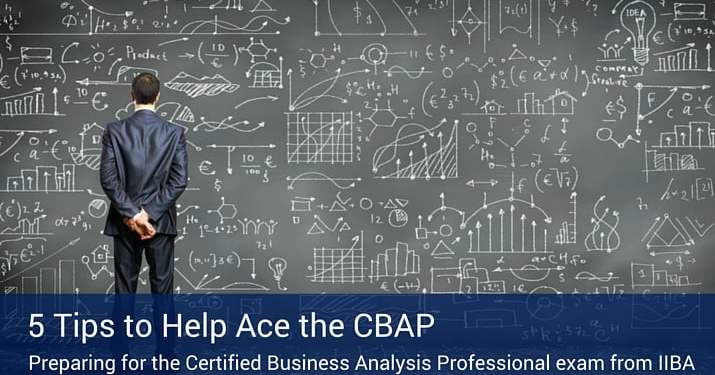5 Tips to Help Ace the CBAP
Last Updated March 31, 2020

The Certified Business Analysis Professional, or CBAP, is one of the most recognized professional certifications achieved by professionals within the business analysis field. To achieve this certification, business analysts are required to have extensive experience the field (a minimum of 7500 hours), and pass the CBAP exam offered by The International Institute of Business Analysis (IIBA).
The CBAP consists of 150 total questions, all of which are formatted as multiple choice. The exam is based on the Business Analysis Body of Knowledge (BABOK) Guide as well as other resources referenced within the publication. Topics can consist of both comprehension and situational analysis. Comprehension questions are typically based on an individual’s understanding of business analysis basics and definitions while the situational analysis questions may require an individual to apply their analysis experience to select the correct answer. Questions cover a range of Blooms taxonomy and candidates are allowed up to three and a half hours to complete the full exam.
Scoring for the CBAP exam is based on a cut score process followed by exam administrators once the test is developed. While the pass rate and cut score for each exam is not released publically, those who take the exam have their raw scores normalized on a standardized scoring scale. Individuals must have a minimum score of 500 to pass the exam.
While preparing for CBAP can seem like a daunting task, it can be helpful to know a few tips that can help ease the process. Here are five study points to follow that may help candidates prepare for the exam.
1. Decide on a Goal
Determine a realistic timeframe to prepare for the exam and set it as your goal. Whether it is a monthly or weekly goal, this can help set the course for a more structured preparation timeline and a more targeted deadline. Candidates can also register for the exam in advance to ensure their commitment and motivation to their study and preparation goals.
2. Gather the Right Study Resources
Although the exam is based on the BABOK Guide, business analysts may find it helpful to gather a variety of CBAP study guides, as they may be easier resources to read, comprehend and aid in enhancing a candidate’s understanding of specific scenarios and concepts in the business analysis field. Once guides are utilized, studying the BABOK Guide may be less overwhelming due to the context and knowledge gained from related study materials.
3. Know the BABOK Guide
Although it may be helpful to read other resource guides, the BABOK guide is where most of the questions come from. It provides candidates with the essential elements needed to prepare for the exam. It’s recommended that individuals ensure they have a complete knowledge of all the terms, definitions and six knowledge areas in the guide. In addition, it’s often recommended to study the tasks, inputs, outputs and techniques associated with these knowledge areas.
4. Use a Practice Exam Simulator
Using an exam simulator to practice can prove to be beneficial in the preparation process. By taking the practice exam, candidates are able to determine the specific knowledge areas in which they need more study. Practice tests can also help candidates read and retain information located in the BABOK Guide.
5. Consider Exam Training
Exam candidates may opt to attend a training program as they prepare to take the exam. Training sessions can provide a clear outline of the exam topics, detailed key pointers for passing the exam and tips for a faster-studying process.
Passing this exam and earning the designation of CBAP is often the highest distinction that can be earned within the business analysis field. In addition, organizations can place a high value on the knowledge and expertise business analysis professionals can provide to their companies.
